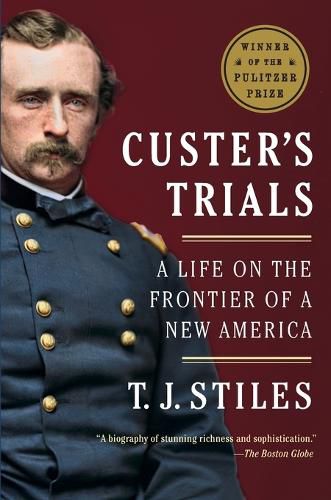Readings Newsletter
Become a Readings Member to make your shopping experience even easier.
Sign in or sign up for free!
You’re not far away from qualifying for FREE standard shipping within Australia
You’ve qualified for FREE standard shipping within Australia
The cart is loading…






Winner of the 2016 Pulitzer Prize for History
Winner of the 2016 Pulitzer Prize for History
In this magisterial biography, T. J. Stiles paints a portrait of Custer both deeply personal and sweeping in scope, proving how much of Custer’s legacy has been ignored. He demolishes Custer’s historical caricature, revealing a capable yet insecure man, intelligent yet bigoted, passionate yet self-destructive, a romantic individualist at odds with the institution of the military (court-martialed twice in six years) and the new corporate economy, a wartime emancipator who rejected racial equality. Stiles argues that, although Custer was justly noted for his exploits on the western frontier, he also played a central role as both a wide-ranging participant and polarizing public figure in his extraordinary, transformational time-a time of civil war, emancipation, brutality toward Native Americans, and, finally, the Industrial Revolution-even as he became one of its casualties. Intimate, dramatic, and provocative, this biography captures the larger story of the changing nation. It casts surprising new light on one of the best-known figures of American history, a subject of seemingly endless fascination.
$9.00 standard shipping within Australia
FREE standard shipping within Australia for orders over $100.00
Express & International shipping calculated at checkout
Winner of the 2016 Pulitzer Prize for History
Winner of the 2016 Pulitzer Prize for History
In this magisterial biography, T. J. Stiles paints a portrait of Custer both deeply personal and sweeping in scope, proving how much of Custer’s legacy has been ignored. He demolishes Custer’s historical caricature, revealing a capable yet insecure man, intelligent yet bigoted, passionate yet self-destructive, a romantic individualist at odds with the institution of the military (court-martialed twice in six years) and the new corporate economy, a wartime emancipator who rejected racial equality. Stiles argues that, although Custer was justly noted for his exploits on the western frontier, he also played a central role as both a wide-ranging participant and polarizing public figure in his extraordinary, transformational time-a time of civil war, emancipation, brutality toward Native Americans, and, finally, the Industrial Revolution-even as he became one of its casualties. Intimate, dramatic, and provocative, this biography captures the larger story of the changing nation. It casts surprising new light on one of the best-known figures of American history, a subject of seemingly endless fascination.